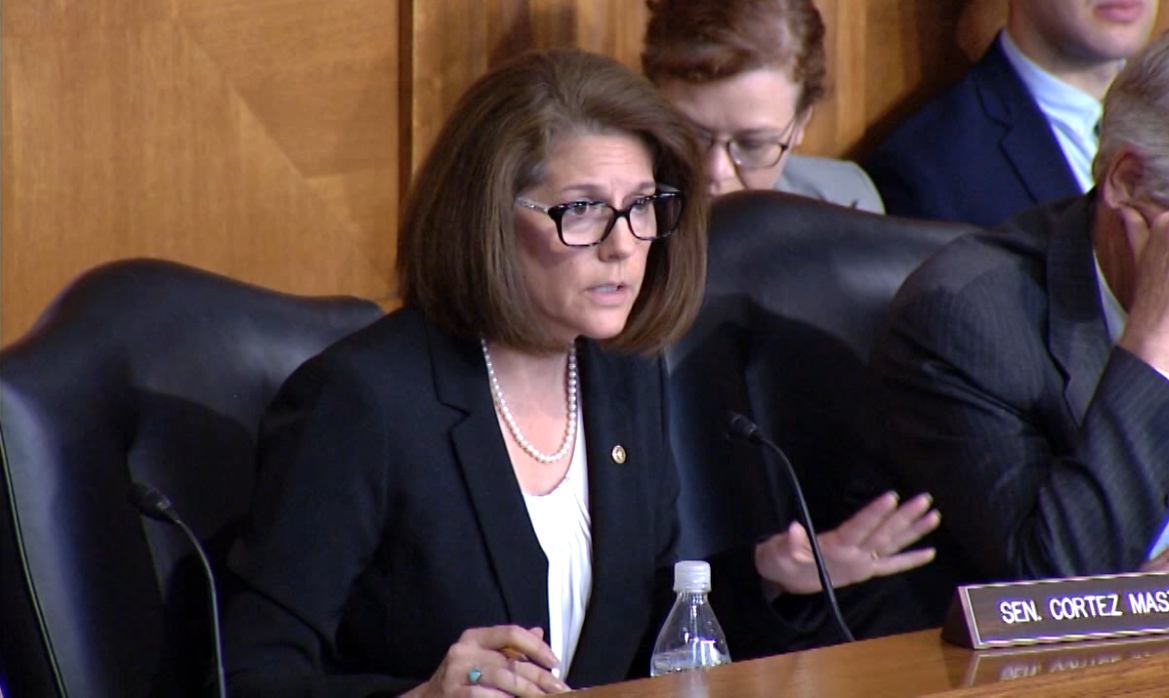Washington, D.C. – At today’s hearing of the Senate Committee on Energy and Natural Resources, Senator Catherine Cortez Masto (D-Nev.) decried the lack of a consent-based and comprehensive approach to nuclear waste storage in America. As part of the discussion, she highlighted her concerns with the Nuclear Waste Administration Act¸ which fails to give Nevada the opportunity to consent to nuclear waste storage, a right all other states would receive.
She also questioned Ms. Maria Korsnick, President and CEO of the Nuclear Energy Institute, about the industry’s refusal to accept research that suggests there are newer, safer and cheaper ways to store nuclear waste, and those solutions are not Yucca Mountain.
In her opening question, Senator Cortez Masto spoke to one of the authors of the Nuclear Waste Administration Act, Senator Lamar Alexander (R-Tenn.). She pointed out that Tennessee has been consistently removed from consideration as a nuclear waste storage site, while Nevada has not been afforded the same chances to say no.
“In 1987, Tennessee was able to successfully remove the Oak Ridge facility as an interim storage facility because they changed the law,” said Senator Cortez Masto. “And now in this bill, the Nuclear Waste Administration Act, Tennessee equally has the opportunity to say no, like every other state except Nevada. That’s all I’m looking for in my state, are those similar opportunities. Particularly with this bill, which [currently] creates an equal consent based siting process for all states except Nevada.
Senator Cortez Masto continued by pointing out specific clauses in the proposed legislation that unfairly place the burden of nuclear waste storage on a state that has never consented to such a plan and doesn’t produce nuclear waste.
“Let me just highlight for the record,” she continued. “Section 306(e) requires the potential host state to veto or approve a [site]…prior to initiating a review licensing process. That essentially leaves Yucca Mountain as the default, sole repository [in the U.S.]. Section 506(a) gives parity to all other states, yet allows Yucca Mountain, and other sites in New Mexico, Texas and Utah to be kept on the list [of potential nuclear waste storage sites] without requiring their consent. Section 509 eliminates the legal 70,000 metric ton limit of waste to be stored at a repository. If no [other] state wants to be a host, this guarantees all the waste goes to Yucca Mountain. My request is that we all be treated equally.”
Later in her testimony, she asked Ms. Maria Korsnick whether the Nuclear Energy Institute (NEI) would support the new Nuclear Waste Administration (NWA), as created in the Nuclear Waste Administration Act, if it halted work on the Yucca Mountain project and proved that a new repository could be done more rapidly and efficiently.
Ms. Krosnick answered, “I don’t see how another process could be done more rapidly with all of the analysis that’s already been done on Yucca. But if you found such a magic place, yes we could be supportive.”
Senator Cortez Masto replied, “Department of Energy (DOE) studies have already shown that walking away from Yucca Mountain and starting over with a new repository could save billions of dollars over the life of the facility. This is the challenge I’ve had. We’ve had a stalemate over the last 32 years, and we’ve offered the opportunity to come in and work with us and find a solution. I think you have that today. But unfortunately what I’ve seen from the industry is the same old playbook and not being willing to even admit there’s an opportunity to move forward. There’s not even a willingness to talk about potential new technology that can be utilized to address safe storage. Now is the time for everyone to come together and move forward on this issue.”
Full video of this exchange is available here.
